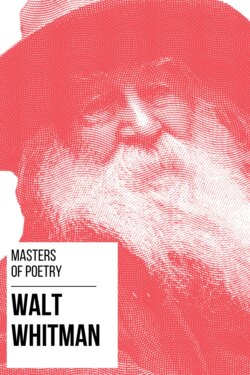Читать книгу Masters of Poetry - Walt Whitman - August Nemo, John Dos Passos, Ellen Glasgow - Страница 44
На сайте Литреса книга снята с продажи.
V
ОглавлениеThen Whitman had a curious habit of standing apart, as it were, and looking upon himself and his career as of some other person. He was interested in his own cause, and took a hand in the discussion. From first to last he had the habit of regarding himself objectively. On his deathbed he seemed to be a spectator of his own last moments, and was seen to feel his pulse a few minutes before he breathed his last.
He has recorded this trait in his poems:—
"Apart from the pulling and hauling stands what I am,
Stands amused, complacent, compassionate, idle, waiting,
Looking with side-curved head curious what will come next,
Both in and out of the game and watching and wondering at it."
As also in this from "Calamus:"—
"That shadow my likeness that goes to and fro seeking a livelihood, chattering, chaffering,
How often I find myself standing and looking at it where it flits,
How often I question and doubt whether that is really me;
But among my lovers, and caroling these songs,
Oh, I never doubt whether that is really me."
Whitman always speaks as one having authority and not as a scribe, not as a mere man of letters. This is the privilege of the divine egoism of the prophet.
Like the utterances of the biblical writers, without argument, without elaboration, his mere dictum seems the word of fate. It is not the voice of a man who has made his way through the world by rejecting and denying, but by accepting all and rising superior. What the "push of reading" or the push of argument could not start is often started and clinched by his mere authoritative "I say."
"I say where liberty draws not the blood out of slavery, there slavery draws the blood out of liberty,"...
"I say the human shape or face is so great it must never be made ridiculous;
I say for ornaments nothing outré can be allowed,
And that anything is most beautiful without ornament,
And that exaggerations will be sternly revenged in your own physiology and in other persons' physiologies also.
"Think of the past;
I warn you that in a little while others will find their past in you and your times....
Think of spiritual results.
Sure as the earth swims through the heavens, does every one of its objects pass into spiritual results.
Think of manhood, and you to be a man;
Do you count manhood, and the sweet of manhood, nothing?
Think of womanhood and you to be a woman;
The Creation is womanhood;
Have I not said that womanhood involves all?
Have I not told how the universe has nothing better than the best womanhood?"
Egotism is usually intolerant, but Whitman was one of the most tolerant of men.
A craving for sympathy and personal affection he certainly had; to be valued as a human being was more to him than to be valued as a poet. His strongest attachments were probably for persons who had no opinion, good or bad, of his poetry at all.
